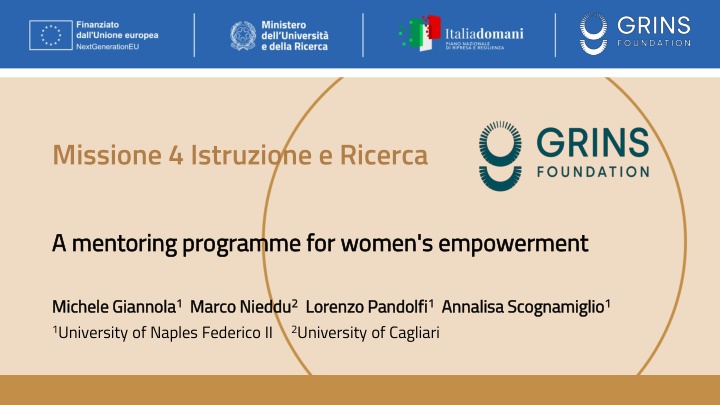Missione 4 Istruzione e Ricerca
Gender pay gap persists despite declining trends. Psychological factors influence women's labor market trajectory. This project partners with an NGO in Southern Italy to study the impact of a mentoring program on female STEM students. The Young Women Empowerment Program aims to equip participants with tools for academic and professional success.
Download Presentation

Please find below an Image/Link to download the presentation.
The content on the website is provided AS IS for your information and personal use only. It may not be sold, licensed, or shared on other websites without obtaining consent from the author.If you encounter any issues during the download, it is possible that the publisher has removed the file from their server.
You are allowed to download the files provided on this website for personal or commercial use, subject to the condition that they are used lawfully. All files are the property of their respective owners.
The content on the website is provided AS IS for your information and personal use only. It may not be sold, licensed, or shared on other websites without obtaining consent from the author.
E N D
Presentation Transcript
Missione 4 Istruzione e Ricerca A mentoring programme for women's empowerment A mentoring programme for women's empowerment Michele Giannola 1University of Naples Federico II 2University of Cagliari Michele Giannola1 1Marco Nieddu Marco Nieddu2 2Lorenzo Pandolfi Lorenzo Pandolfi1 1Annalisa Scognamiglio Annalisa Scognamiglio1 1
While the gender pay gap is declining women still earn less than men Differences party explained by sorting into industry and occupation but the gap persists after accounting for selection (Goldin, 2014) Gender gaps are particularly pronounced in male-dominated fields such as STEM disciplines (Bertrand et al., 2010; Michelmore & Sassler, 2016)
Several explanations have been proposed and documented: 1. Women ask for lower salaries (Rousille, 2022) 2. Women negotiate less intensively (Biasi and Sarsons, 2022) 3. Women are less likely to engage in self-promotion (Exley and Keller, 2023) 4. Gender differences in job search behaviour (Cort s et al, 2023) This evidence points to psychological factors as key mechanisms What policies work to reduce these gaps and improve women s labour market trajectories?
This project We partner with an NGO working on human capital development in Southern Italy to study the effects of mentoring programs for female university students We design and implement a Randomized Controlled Trial assigning students to a treatment and control group We follow students longitudinally, and collect detailed data on their beliefs, expectations, confidence, educational and labour market outcomes
The programme - I YEP Young women Empowerment Program: mentoring programme targeting female students enrolled in the last two years of a STEM degree in the main Universities of Southern Italy Participant students (mentees) paired with experienced professionals (mentors): female managers working in large Italian companies from different industries Objective of the program: provide participants with tools to make informed academic and professional choices and facilitate the school-to-work transition
The programme - II Mentors and mentee meet monthly for a period of six months To make the program as flexible as possible meetings can take place in person or remotely, at a time that is convenient for the pair Meetings are intentionally non-structured allowing to discuss topics identified as relevant by the pair and allowing students to ask questions, share doubts, and learn from their mentor s experience
Theory of Change We expect the program to impact participants labour market prospects through: 1. Aspirations: exposing participants to charismatic female role models would improve students sense of belonging, self-efficacy, confidence, and motivation 2. Information: sharing information about the school-to-work transition would help students make more informed choices 3. Network: enhanced networking opportunities with managers of important Italian companies and with other mentees
Experimental design Randomize applicants to treatment and control using an oversubscription model T1 individual treatment: one-to-one meetings T2 group treatment: each mentor follows a group of three mentees C control group To reduce differences between & improve power students will be stratified by university and field of study
Timeline & Data collection Baseline: before the start of the program and prior to randomizing students Short run effects: at the end of the progamme Long run effects: six to nine months after the programme Repeated next academic year ~ total 600 participants (1800 interviews)
Measures Following the theory of change we collect data on: Self-efficacy, motivation, and wellbeing Academic outcomes (possibly through administrative records) Expectations and beliefs about labour market outcomes Realized labour market outcomes (follow-up)
Measures Beliefs about labour market outcomes: Adesso pensa a te stessa al termine del tuo percorso di studi. Su una scala da 1 a 10 (dove 1 indica un evento poco probabile e 10 indica un evento molto probabile), quanto ritieni probabile che troverai un impiego entro 6 mesi? Poco probabile 1 Estremamente probabile 10 Non sa 2 3 4 5 6 7 8 9 Probabilit che tu riesca a trovare un impiego entro 6 mesi
Measures Beliefs about labour market outcomes: Pensando a te stessa al termine del tuo percorso di studi, ti aspetti che il tuo stipendio mensile per il tuo primo impiego, al netto di tasse e detrazioni sia? Con quale probabilit accadr ? a) a) a) a) a) a) a) Totale Compreso tra 0 e 500 euro Compreso tra 500 e 1000 euro Compreso fra 1000 e 1500 euro Compreso fra 1500 e 2000 euro Compreso tra 2000 e 2500 euro Compreso tra 2500 e 3000 euro Maggiore di 3000 euro x% x% x% x% x% x% x% 100%
Where we stand Mentors recruitment Study conceptualization Call for interest is currently open and we are collecting applications Questionnaire design Next: IRB, randomization of applicants




















